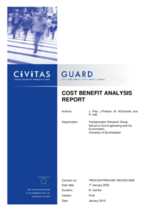Introducing biogas and particulate filters for buses
Summary
In order to achieve a 100 percent clean bus fleet, Toulouse investigated the feasibility of using bio-gas and bio-diesel and installing the latest-generation particulate filters.
Implementing sustainable mobility
Prior to the CIVITAS MOBILIS measure, the bus fleet operated by the public transport authority Tisseo comprised 100 buses running on compressed natural gas (CNG) and 414 diesel buses, none of them using biodiesel or particulate filters. Tisseo’s objective was to achieve a 100 percent clean public transport fleet by 2008 by
- investigating and demonstrating the use of biodiesel and analysing the framework conditions of biodiesel supply;
- studying the production and use of biogas as a source of CNG in the Toulouse area; and
- equipping diesel buses with state-of-the-art particulate filters in order to reduce pollutant emissions.
Progress
From January 2006 to November 2006, Tisseo carried out a feasibility study in collaboration with a school of agronomy in Toulouse regarding the changeover of part of its diesel fleet to biodiesel. Between January and December 2008, Tisseo tested the use of biodiesel (at 30 percent) in 81 of the fleet’s oldest buses.
From September 2005 to April 2006, again with the support of the school of agronomy, Tisseo assessed the available biogas sources in the Midi-Pyrenees region. Between February 2005 and August 2006, they carried out a feasibility study into the use of biogas by the Tisseo bus fleet. In 2007, they started to plan the implementation of biogas use in Tisseo’s bus fleet and began lobbying to lift the legal barriers to the use of biogas (notably the ban on the injection of biogas into the natural gas network) in Toulouse. Between January and June 2006, Tisseo bought 65 diesel buses fitted with particulate filters, and between December 2006 and July 2007, 40 particle filters were installed on the diesel buses already in use.
Outcomes
During the MOBILIS project period (2004 to 2008), bus fleet emissions of nitrogen oxide fell by 31.9 percent; carbon monoxide by 54.2 percent; hydrocarbon by 42.8 percent; and particulate matter by 84.4 percent.
Based on the results of the feasibility study, Tisseo expressed interest in using biogas as soon as the national regulation on biogas would allow the injection of biogas into the natural gas network.
As a result of the particulate filters, the amount of particulate matter emitted per 1,000 km was reduced by 90.9 percent between Euro 2 diesel buses and Euro 2 diesel buses fitted with filters. The installation of particulate filters on 27 diesel buses prevented 6.6 tons of particulate emissions in 2008. On this basis, Tisseo decided to include particulate filters as a requirement in the specifications in all calls for tenders.








